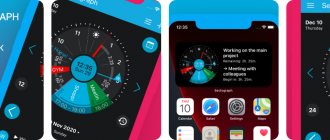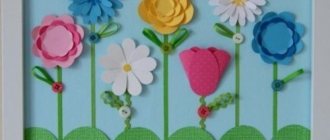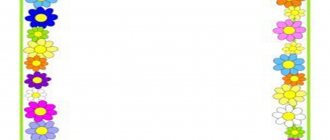Consultation for teachers of preschool educational institutions “Non-traditional forms of working with parents in preschool educational institutions in the conditions of the Federal State Educational Standard”
Consultation for teachers of preschool educational institutions “Non-traditional forms of working with parents in preschool educational institutions in the conditions of the Federal State Educational Standard before”
Consultation for teachers of preschool educational institutions “Non-traditional forms of working with parents in preschool educational institutions in the conditions of the Federal State Educational Standard before”
Consultation for preschool teachers
«Non-traditional forms of working with parents in preschool educational institutions
under the conditions of the Federal State Educational Standard
»
Family and preschool are two important institutions for the socialization of children. Their educational functions are different, but for the comprehensive development of the child their interaction is necessary - this is a pressing issue today. The term "interaction"
involves the exchange of thoughts, feelings, and experiences in the process of communication.
New forms of interaction between teachers and parents involve dialogue
and the establishment of
“feedback”
.
Forms of communication between teachers and parents
Contents of work with parents
implemented through various
forms
.
The main thing is to convey knowledge to parents
.
There are traditional and non-traditional forms of communication between teachers and parents of preschool children
, the essence of which is to enrich them
with pedagogical knowledge
.
Traditional forms
are divided into collective, individual and visual
information
.
Collective forms
.
Collective forms include parent meetings
.
This is an expedient and effective form of work
for educators with a team of
parents
, organized familiarization with the tasks, content and methods of raising children of a certain age in
a
kindergarten and family.
The meeting must be purposeful, that is, have a specific purpose, meet the needs and interests of parents
, and have a clearly defined practical nature. The choice of topic is determined by the objectives of the annual plan. It is advisable to prepare short reminders.
The next collective form of interaction with parents is a conference
.
Its mission is to promote the best practices in family education. parents'
experiences , for example, on the topics
“Leisure time in the family”
or
“Physical development of the child in the family
.
Parents
can share their experiences. During the conference, a set of methods is used - visual materials, presentations, and speeches by specialists.
Customized forms
.
Individual forms of interaction with parents include conversations and consultations
.
Conversations are the most accessible and widespread form of establishing communication between a teacher and a family.
, systematic communication with the child’s father and mother, and other family members.
The goals of the pedagogical
conversation are to exchange opinions on a particular issue and achieve a common point of view, providing
parents
with timely assistance. The conversation involves dialogue, but the leading role belongs to the teacher.
Consultations are organized in order to
to answer all
parents'
.
Consultations are close to conversations
.
The main difference in conducting these forms is that
the
teacher
seeks to give qualified advice to teach something. They can be carried out by a doctor, music director, teacher, psychologist, speech therapist.
Visual and informational
Visual forms
play an important role in interaction with the family. Let's take a closer look at them.
Open Day. Parents
monitor the activities of children and teachers.
They get to know the kindergarten from the inside
, get acquainted with the organization of the subject-play environment, and the types of children's activities.
Mobile folders are so called because they are given to families for temporary use. They contain specific material about children's perceptions and education. Specific recommendations, memos, newspaper clippings, photos, brochures, quotes, etc. are placed in the mobile folder. For example: “What to do if a child does not want to put away toys”
,
“How to put a child to sleep?”
.
Non-traditional forms of interaction with parents
aimed at attracting
parents to preschool educational institutions
and establishing
informal contacts
.
Forms of communication between teachers and parents include
:
1. information and analytical
2. leisure,
3. educational,
4. visual information forms
.
Information and analytical forms
are aimed at identifying interests, requests of
parents
, establishing emotional contact between
teachers
,
parents and children
.
These include: survey; tests; survey; social passport; “Help mailbox”
or
“Helpline”
, where
parents
can post questions that concern them and give advice
to parents and kindergarten employees
.
This will help to better navigate the pedagogical
needs of each family and take into account its individual characteristics.
Leisure forms – joint leisure activities
, holidays, exhibitions - are designed to establish warm,
informal
, trusting relationships, emotional contacts between
teachers and parents
, between
parents and children
.
Leisure activities allow you to create emotional comfort in a group. Parents
become more open to communication.
This form
can become a cultural center in kindergarten, uniting
like-minded parents
.
Family theaters, concerts, games - competitions with the participation of family members, where children look at their parents and cheer for them
.
Games: “Fair”
,
“Field of Miracles”
,
“Guess the Melody”
,
“What, Where, When?”
, culinary competition
“Sweet Hour”
.
You can organize interesting competitions “Successful Parent ”
,
“Family of the Year”
. As you know, a common goal and common experiences bring adults and children together.
Cognitive forms
play a dominant role in improving the psychological and
pedagogical culture of parents
.
Their essence is to familiarize parents
with the age and psychological characteristics of preschool children, and
to develop
practical skills in raising children.
The main role belongs to meetings of non-traditional form
.
Non-traditional means that
at
parent-teacher
meetings it is necessary to use such methods and techniques that activate the attention
of parents who are tired after work
, make it easier to remember the essence of conversations, and create a special mood for a friendly, frank and business-like conversation.
All this increases the interest of parents
in issues of raising children, significantly increases turnout, and activates
parents
to solve educational problems.
Non-traditional forms of holding parent meetings
«Pedagogical laboratory»
.
It is recommended to carry out at the beginning or end of the year. They discuss the participation of parents
in various events.
A questionnaire “ Parent – child – kindergarten”
.
Either planned events are discussed, or past ones are analyzed and results are summed up. At the beginning of the year, a survey is carried out so that the teacher gets to know the child better
and his characteristics.
Parents
are introduced to the events planned for the year,
parents'
, what help and support they can provide in the planned events, as well as their wishes and suggestions for the school year. At the end of the year, at such meetings, the results of the past year are summed up, achievements and mistakes are assessed and analyzed.
"Readers' Conference"
.
2 weeks in advance, parents
are informed about the topic of the meeting and are offered material on this topic.
A preparatory stage is carried out before the meeting, where parents
are given some task on the stated topic.
The prepared task is discussed from various positions. The teacher
asks to comment on this or that statement, illuminates the essence of the topic and asks questions during the discussion.
For example, at what age should you seek help from a speech therapist? Several statements are offered, and parents comment
, discuss these statements, and share their opinions on this issue.
"Auction"
.
The meeting takes place in the form of “selling”
useful tips on a selected topic in a playful
way
.
For example, the formation of
phonemic perception.
The teacher
gives the concept - phonemic perception.
Together with parents
, he analyzes why it is so important to develop it in a child, then invites
parents to share advice
, their experience, what games and techniques can be used to
develop
.
Everything happens in the form of a game and chips are given for each advice (i.e., tips are sold for chips)
.
The councils that have collected the most chips are placed on the “Piggy Bank of Parental Experience ”
.
“Seminar – workshop”
.
parents
, psychologist and other specialists
can speak at the meeting Together with parents
, problem situations are played out or solved; elements of training may be present.
The topic and presenter are determined; they can be either a teacher
parents
or invited specialists.
For example, let’s take the topic “The role of play in the speech development of children
.
A short theoretical message is prepared, then parents
are invited to watch several games that children play in kindergarten. Think about what aspects of speech development are practiced in these games. Remember the games that they themselves played in childhood and which they can teach their children, their value from the point of view of speech development.
"Sincere conversation"
.
The meeting is not intended for all parents
, but only for those whose children have common problems
(communicating with peers, aggressiveness, etc.)
.
For example, a child is left-handed. with parents
to better understand the characteristics of their children.
And establish exactly what degree of left-handedness the child has: weak or severe. The problem is discussed from all sides, experts may be invited. Parents
are given recommendations on the developmental characteristics of such a child.
Parents
are offered various tasks for left-handed children in order to develop motor skills of both hands. Psychological problems associated with left-handedness are discussed.
"Master Class"
.
A meeting where parents
demonstrate their achievements in raising children.
The meeting has a preparatory stage: the teacher
invites several
parents
to conduct a small lesson - to share their experience in developing children, for example, coherent speech.
Parents
give practical advice, show a role-playing scene or game, for example, composing
“Find out by description”
.
At the end of the meeting, the results are summed up, and parents
are offered to choose the most valuable tips, which are posted on the
“ Piggy Bank of Parental Experience ”
.
"Talk show"
.
A meeting of this form
implies a discussion of one problem from different points of view, detailing the problem and possible ways to solve it.
Parents
, educators, and specialists
perform at the talk show For example, let's take the crisis of 3 years. Parents
are offered various situations; they need to be considered from different points of view, always giving reasons for them. Key concepts of crisis are defined
3 years, the reasons are jointly identified, then the opinions of psychologists are read out. All positions are discussed together. Parents
They themselves determine how to solve the problem.
"Evenings of questions and answers"
.
Beforehand, parents
are given the task of thinking through and
formulating
the questions that most concern them.
By discussing them with specialists and other parents
, choose the best ways to solve them.
“Training game exercises and tasks”
.
They help to evaluate different ways of interacting with a child, choose more successful forms
of addressing and communicating with him, and replacing undesirable ones
with constructive ones
.
A parent
involved in game training begins to communicate with the child and comprehends new truths.
Game "Hits"
.
A conversation was held with the children in advance, and the children's answers were recorded on a tape recorder: What do you like to do? Your favorite dish? Favorite fairy tale? etc. At the meeting, parents
were asked the same questions: Your child’s favorite dish, favorite game.
Parents
provided written answers and then compared their answers with their children's.
Thus, the parents
themselves made a conclusion about how well they know their child.
"Creating a drawing in a circle"
. Participants draw a picture on a piece of paper. On command, drawing stops, and the drawing is transferred to the neighbor on the right, who continues drawing further. This continues until the drawings go around the circle.
"I'm just like you"
. The leader has the ball in his hands. The one who gets it throws it to anyone and, calling him by name, explains why he is the same: I am the same as you, because...” The one to whom the ball was thrown expresses agreement or disagreement and turns to the other participant.
If the topic of the meeting is motor development. Parents
They play with plasticine, with cereals, with dough.
Conduct training for parents
in finger gymnastics, offer drawing, tracing, etc.
If the topic is related to speech development. Offer various games and exercises for speech development: “Say the opposite”
,
"Continue the sentence"
.
To replenish parental
knowledge about psychological health, about emotional states, I use psychological games, self-regulation exercises, and to reduce psycho-emotional stress.
Visual – information forms are necessary
in order to correctly evaluate the activities
of teachers
, to review the methods and techniques of family education.
For example, open classes for parents
, watching videos, photographs, exhibitions of children's
works
.
— Open classes. Conducting open classes in preschool educational institutions can be organized in different ways. For example, in one case the parents
as guests they attend classes where their superficial judgment about the educational process in kindergarten, the profession of a teacher, is overcome.
They see their own children in an environment that is unusual for them, and receive recommendations about the education of children in the family. In another case, parents
can be active participants
in the pedagogical process
.
They answer questions, move together with the children to music, sing, draw, complete the teacher’s tasks
, etc. d. Here, fathers and mothers act as partners of the teacher. You can also involve them in participating in children’s play, leisure and work activities.
— Meetings with interesting people are meetings with parents of different professions
.
Parents
also introduce their children to the culture of their people through everyday life, traditions, folklore, and treats.
— Involving dads and moms in participating in community cleanups, landscaping, and building snow towns on the territory of the kindergarten, as well as taking part in shows and competitions.
— Parent corners
.
This form of work
is traditional.
In order for it to be valid and help activate parents
, it can and should be diversified:
— Creation of a newspaper for parents
for each group or for kindergarten with different headings
— Activity sheets: they contain material that makes it possible to understand what a child does in kindergarten, specific games that can be played, tips, tasks.
— Experience exchange events among parents “Treasury of Parental Advice ”
— Photo montages
— Information
sheets with detailed
information about each child
,
prepared by parents together with their children
.
— Exhibitions organized with parents
:
“Our favorites”
- photos of our favorite animals,
“My Small Motherland ”
- a competition of photographs of our native land,
“Sun, air and water are our best friends”
- photos of children in the fresh air at different times of the year
— Stands designed jointly with parents
:
“When we were little...”
- stories from mothers and fathers,
“I know how, I can, I love”
-
information about the skills
, achievements, interests of the child,
“Through the mouth of a baby”
- humorous statements from children
— Creation by parents
albums after the holidays
In order to work
was more productive, activities with
parents
can be organized at different levels: general kindergarten, intra-group, individual-family.
"Oral Journal"
- one of the appropriate
forms of work with a team of parents
, which allows them to familiarize them with several problems of raising children in
a
kindergarten and family, ensures the replenishment and deepening of
parents’
on certain issues.
"Weekly Notes"
.
A weekly note addressed directly to parents
informs the family about the child's health, mood, behavior in kindergarten, his favorite activities and other
information
.
«Informal notes»
.
Caregivers can send short notes home with the child to inform
the family about the child's new achievement or skill just mastered, to thank the family for the help provided; there may be recordings of children's speech, interesting statements from the child, etc. Families can also send notes to the kindergarten expressing gratitude or containing requests.
"Bulletin board"
.
A bulletin board is a wall display that informs parents
about meetings for the day, etc.
"Reports"
.
Written reports of child development are a form of communication with families
that can be useful as
long as
they do not replace face-to-face contact.
There are techniques for creating roles for parents
.
Parents
can play different
formal and informal roles in the program
. Below are some of them.
Guest of the group. Parents should be encouraged to come
to a group to watch and play with children.
Volunteer. From parents
and children may have common interests or skills. Adults can help teachers, take part in performances, help organize events, provide transportation, help clean, arrange and decorate group rooms, etc.
And the most important thing!
To work with parents
it was productive for you
1. Communicate with parents
without tension and anxiety, kindly, interested.
2. Give it to your parents
feel your respect and attention to them.
3. Try to understand your parents
, correctly identify the problems that concern them most.
4. Help parents
find optimal ways and means of solving problem situations,
build
their confidence that in raising children they can always count on your support and the help of other
kindergarten teachers
.
5. It is important that the parents of all students
: both prosperous and difficult to educate, left the childcare center with faith in their child and in you.
The purpose of interaction between the preschool educational institution and the family
Definition 1
Interaction is one of the ways of organizing joint activities, carried out on the basis of social perception and through communication.
Definition 2
Collaboration is peer-to-peer communication in which no one has the privilege of control, evaluation, or direction.
Currently, the entire system of activities of preschool educational institutions is aimed at accepting the pupil’s family as the main and most important person directly involved in the process of raising and educating the child. That is why the participation of the pupil’s family in the pedagogical process of preschool educational institutions helps to improve the quality of education for preschool children. This is explained by the fact that each parent knows his child, his interests much better and, accordingly, is able to develop the necessary strategy for his further development.
Are you an expert in this subject area? We invite you to become the author of the Directory Working Conditions
Note 1
The main goal of interaction between the preschool educational institution and the family is to ensure optimization of the continuity of child upbringing in the preschool educational institution and the family, providing parents with the necessary professional assistance on educational issues.
There are two main forms of interaction between preschool educational institutions and families: traditional and non-traditional.
Definition 3
Forms of interaction are ways of organizing joint communication and activities.
Traditional forms of communication are time-tested, have been used for a long time, and are used by all preschool teachers. Non-traditional forms appeared relatively recently, their use in practice is not as widespread as traditional forms.
Definition 4
Non-traditional forms of interaction between preschool educational institutions and parents are forms of communication and activities organized between parents and preschool educational institutions and used to establish informal contacts with parents.
Finished works on a similar topic
Course work Traditional and non-traditional forms of interaction between a preschool educational institution and parents 460 ₽ Abstract Traditional and non-traditional forms of interaction between a preschool educational institution and parents 250 ₽ Examination Traditional and non-traditional forms of interaction between a preschool educational institution and parents 200 ₽
Receive completed work or specialist advice on your educational project Find out the cost



